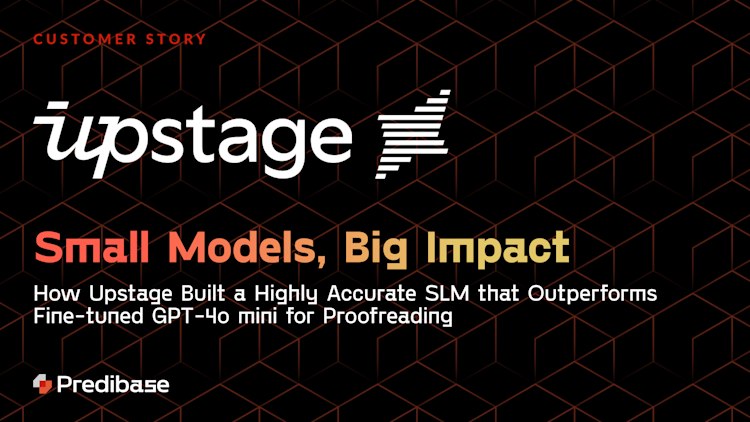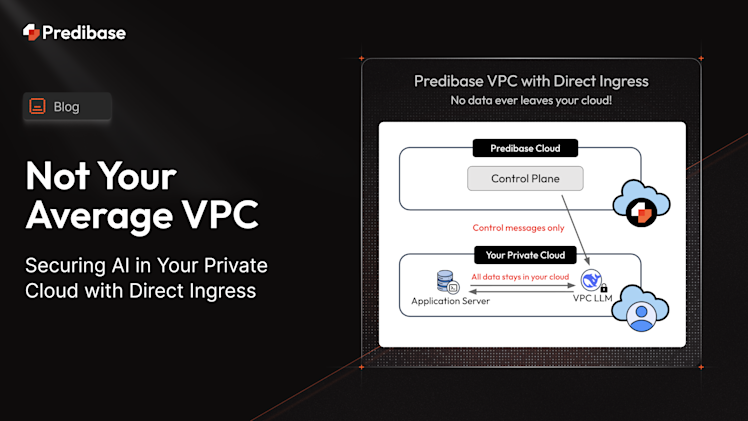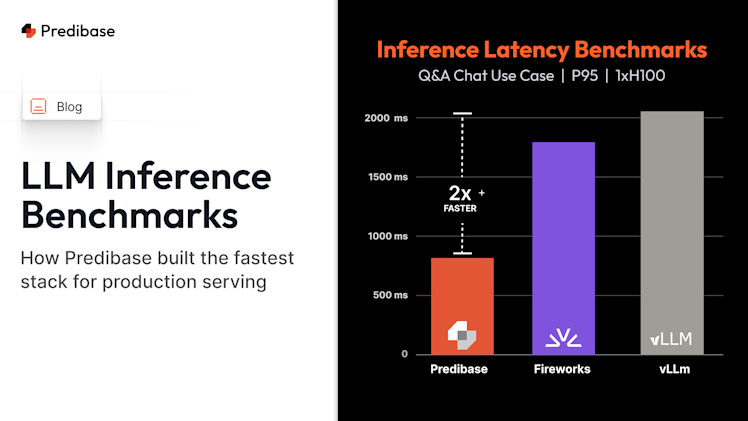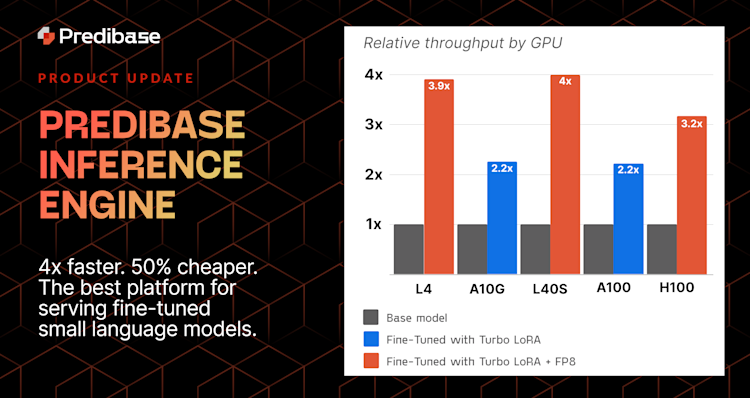Solar-Proofread achieved 79% accuracy for a major international media company with a daily circulation of over 1.8 million, surpassing both base (25%) and fine-tuned (71%) GPT-4o mini in terms of quality and cost.
Proofreading thousands of words per day is a highly detailed task, requiring a deep understanding of grammar, syntax, and vocabulary in multiple contexts. For a leading international media company, reviewing more than 1,800 articles per month was taking a toll on their editorial staff, cutting into time that could be spent on research and content creation. This case study explores how Upstage, a pioneering AI company specializing in building powerful LLMs for enterprises, used Predibase to fine-tune their own proprietary model "Solar-Mini" to efficiently and accurately proofread at scale. Solar-Mini is available for fine-tuning and serving exclusively on Predibase, and you can try it today for free.
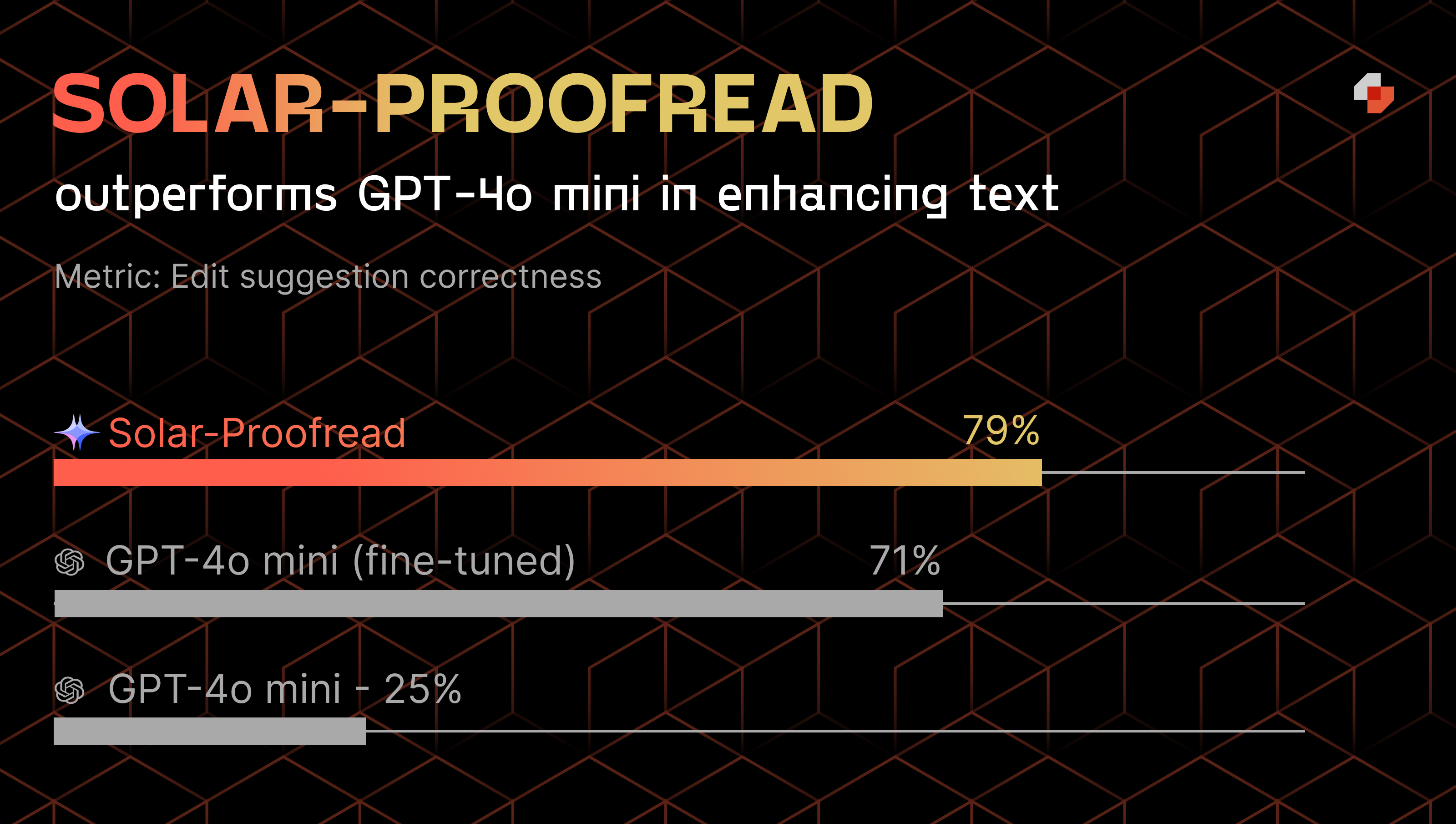
Background
Upstage is South Korea’s leading AI company providing enterprise AI and LLM solutions to 100s of customers like Samsung Life Insurance, AIA Life Insurance, Hyundai, Sendbird, and Qanda. Having raised over $100 million since their founding in 2020, they’re the most-funded South Korean AI software company in history. They specialize in tailoring their flagship LLM–Solar–for specific business use cases, outperforming GPT-4 and other large models in terms of accuracy and cost effectiveness.
When a major international media company came to them, they were struggling under the weight of proofreading over 60 articles per day.
“They needed a way to create a more efficient, modern newsroom by handing over the repetitive, highly trainable task of proofreading,” said Sung Kim, Co-Founder and CEO at Upstage. “We saw an opportunity to use Predibase to demonstrate that fine-tuning our Solar-Mini model could create a model designed to accurately catch typos and grammatical errors that even the most dedicated human might overlook.”
Why off-the-shelf LLMs fall short
Large LLMs have captivated the media’s attention and drawn significant awareness towards the potential of AI to fill business needs — particularly ones that are tedious and repetitive. Unfortunately, large, off-the-shelf LLMs like GPT-4 and Claude 3.5 Sonnet aren’t always the best enterprise solution due to the high cost, long deployment time, and lack of domain and task-specific knowledge.
Previously, the media company experimented with using popular LLMs such as OpenAI’s models to meet their proofreading needs. These were met with limited success and were not suitable for production, as they could not accurately pinpoint errors and were prohibitively expensive at scale. They were searching for a solution that would be highly accurate, more cost effective, and could efficiently handle a large volume of articles daily — and Upstage was ready to deliver.
How Upstage created a custom SLM with Predibase
Solar-Mini is Upstage’s SLM (small language model) that delivers responses comparable to GPT-3.5, but 2.5 times faster. When initially launched, Solar-Mini reached the top of the Hugging Face Open LLM Leaderboard, a testament to its high quality. Designed from the ground up for efficient fine-tuning, it was the perfect candidate for creating Solar-Proofread, a custom designed SLM perfect for the specialized proofreading needed in the fast-moving journalism industry.
Upstage selected Predibase as their partner to fine-tune Solar-Mini thanks to their reputation for accuracy and rapid testing and deployment. Working together, they leveraged the media company’s extensive archive for training purposes, tapping into a collection of 1,800 articles from the past three months. Two hundred additional articles were used as an evaluation set, with each article having approximately five corrections for a total of 975 corrections across the evaluation set. The team compared the model by testing it against fine-tuned GPT-4o mini for accuracy, speed, and cost effectiveness.
Results: Outperforming fine-tuned GPT-4o mini
The team was thrilled to discover that their fine-tuned model on Predibase, Solar-Proofread, outperformed both the base and a fine-tuned version of GPT-4o mini on edit suggestion correctness. Solar-Proofread was 79% accurate in identifying errors, compared to the fine-tuned GPT-4o mini model (71%) and the GPT-4o mini base model (25%).
Looking more closely at the evaluation, Solar-Proofread had half as many false positives as fine-tuned GPT-4o mini.
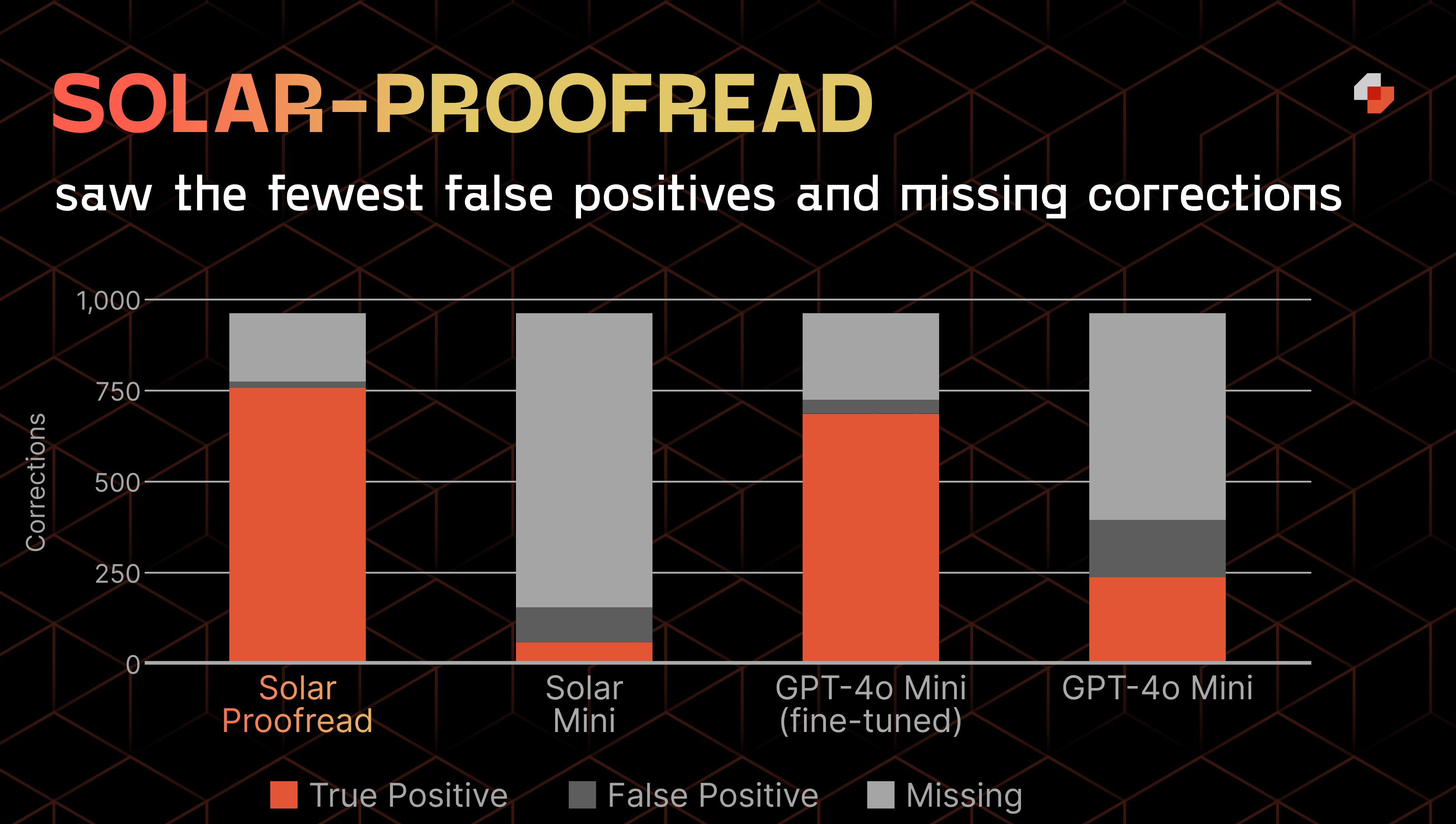
The Upstage team also measured how many “redundant” corrections were made, i.e. corrections that the model identified that are not in the correct answer. This category of error especially benefited from fine-tuning as both the Solar-Mini and GPT-4o mini base models identified thousands of redundant corrections.
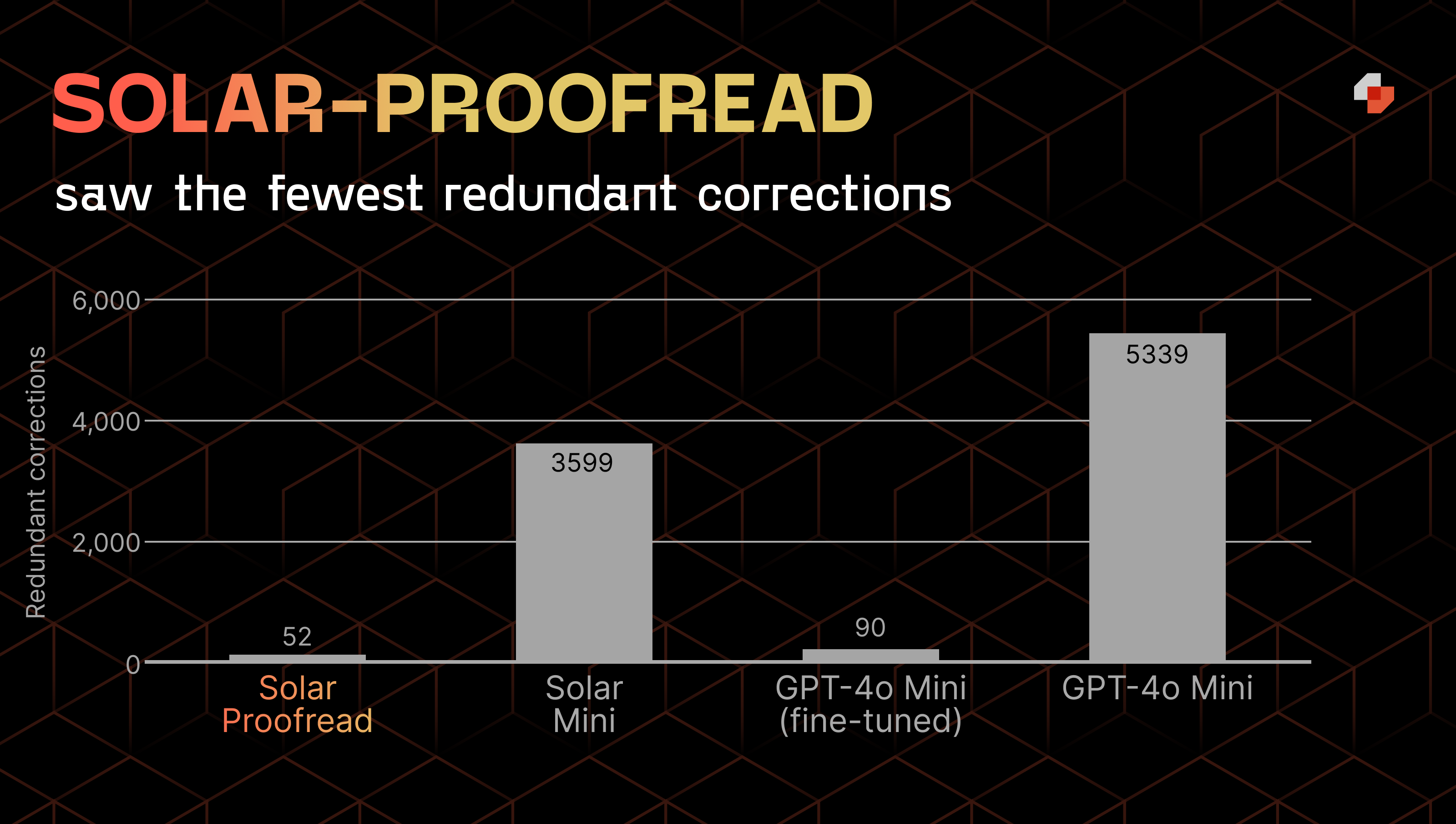
With the help of Solar-Proofread, the media company was able to significantly speed up their proofreading process, allowing them to reallocate valuable resources to creating new content and lowering their operational costs in the process. Furthermore, it demonstrates the value of Solar-Mini for other specialized tasks beyond proofreading, such as analyzing and responding to customer feedback or categorizing expenses for financial reports.
Conclusion
Upstage is empowering businesses to think differently about how they integrate AI into their workflow. Solar-Proofread is a prime example of the potential of SLMs to outperform larger models, helping businesses become more efficient and save time on manual labor.
“SLMs are poised to have a significant impact on how we develop models for customer use cases like proofreading,” said Kim. “We’re thrilled with the high accuracy achieved by Solar-Proofread and couldn’t have done it without Predibase’s fine-tuning.”
Discover why Upstage, one of South Korea's fastest-growing AI companies, is now offering LLMs in the US by exploring their website or following them on LinkedIn. To try fine-tuning Solar-Mini on Predibase yourself, sign up for our 30-day free trial.
